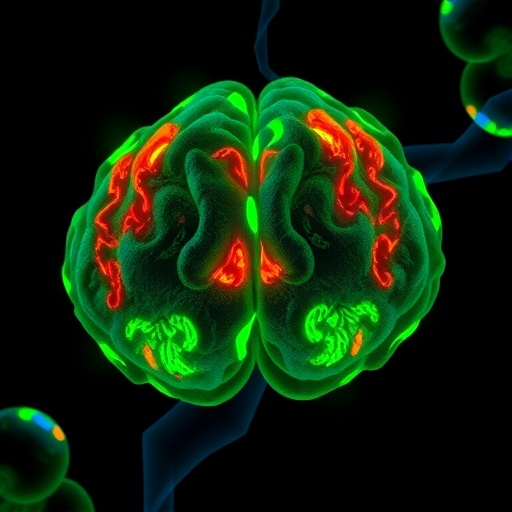In the relentless pursuit of understanding glioblastoma multiforme (GBM), one of the most aggressive and deadly brain cancers, recent research has uncovered intriguing molecular dynamics that could reshape therapeutic strategies. Published in the latest issue of Medical Oncology, the study by Al Shboul, Zhao, Esposito, and colleagues unveils the selective regulation and pivotal role of a lactate transporter, MCT4, in the metabolic machinery of GBM cells. This breakthrough offers fresh perspectives into the intricate metabolic dependencies that sustain tumor growth and resistance.
Glioblastoma is notoriously resilient, with its malignant cells exhibiting remarkable metabolic plasticity. The Warburg effect, where cancer cells preferentially ferment glucose to lactate even in the presence of oxygen, has long dominated the narrative on tumor metabolism. Yet, the nuanced mechanisms driving the export and import of lactate, a key metabolic byproduct, have remained underexplored. MCT4, a member of the monocarboxylate transporter family, has garnered attention for its role in facilitating lactate efflux from hypoxic or glycolytically active tumor cells, potentially relieving intracellular acidification and supporting a favorable microenvironment for cancer progression.
The study meticulously dissects the expression patterns of MCT4 in GBM tissues, juxtaposing them against cellular metabolism and tumor microenvironmental conditions. Using advanced molecular assays and in situ analyses, the authors demonstrate heightened MCT4 expression specifically in hypoxic niches within GBM tumors. This spatially selective upregulation suggests a sophisticated adaptive mechanism where tumor cells responding to oxygen deprivation orchestrate lactate clearance, thereby sustaining their glycolytic flux and survival advantage.
Functionally, the research delineates how MCT4 modulates cellular metabolism beyond mere lactate transport. Through gain- and loss-of-function experiments in GBM cell lines, it becomes evident that MCT4 not only maintains intracellular pH homeostasis but also influences mitochondrial respiration rates, reactive oxygen species (ROS) production, and metabolic substrate utilization. The data reveal a compelling connection between MCT4 activity and the metabolic reprogramming of GBM cells, fostering an environment conducive to tumor aggressiveness and therapeutic resistance.
Importantly, the interplay between MCT4 and the tumor microenvironment emerges as a crucial determinant in GBM pathophysiology. The authors spotlight how MCT4-mediated lactate export potentiates tumor-associated macrophage polarization and immune evasion, reinforcing the immunosuppressive landscape that characterizes GBM infiltrates. This crosstalk underlines the broader significance of metabolic transporters in modulating not only cancer cell intrinsic properties but also extracellular signaling networks.
From a translational perspective, MCT4 stands out as a promising candidate for targeted inhibition. The study’s biochemical analyses illustrate that pharmacological blockade or genetic silencing of MCT4 disrupts lactate efflux, leading to intracellular acidification, metabolic stress, and subsequent reduction in GBM cell viability. These outcomes underscore the therapeutic potential of MCT4 antagonists as adjuncts to conventional treatments, designed to exploit the metabolic vulnerabilities of glioblastoma.
Delving deeper, the research team examines the regulatory circuits controlling MCT4 expression in GBM cells. Hypoxia-inducible factors (HIFs), well-known orchestrators of hypoxic responses, are implicated as upstream modulators of MCT4 transcription. The convergence of hypoxia signaling and metabolic adaptation through MCT4 amplifies tumor survival pathways, illustrating a tightly knit regulatory axis amenable to intervention.
Furthermore, the study addresses potential resistance mechanisms that may arise from targeting MCT4. Tumor heterogeneity, a hallmark of GBM, can entail compensatory upregulation of alternate monocarboxylate transporters such as MCT1, potentially neutralizing the efficacy of selective MCT4 inhibition. To this end, the paper suggests combinatorial strategies integrating dual transporter blockade or coupling metabolic interventions with immunotherapies to overcome adaptive resistance and maximize clinical benefit.
Technologically, the research capitalizes on cutting-edge metabolomic profiling and live-cell imaging techniques to unravel the dynamic metabolic flux influenced by MCT4. This methodological innovation enables real-time mapping of lactate gradients and metabolic rewiring within tumor microenvironments, providing granular insights rarely achieved in prior studies. The detailed visualization illuminates the spatial and temporal dimensions of metabolic regulation in GBM, reinforcing the model of MCT4 as a metabolic gatekeeper.
This breakthrough has sparked conversations within the oncological community about reframing GBM treatment paradigms. By targeting metabolic dependencies unique to cancer cells, such as MCT4-mediated lactate export, there is potential to erode tumor resilience and sensitize tumors to existing modalities including radiotherapy and chemotherapy. The findings herald a new frontier where metabolic transporters serve as critical nodes for therapeutic intervention.
Looking ahead, the authors advocate for the development of selective MCT4 inhibitors with enhanced brain penetration and minimal off-target effects. The pharmacodynamic profiles of such agents will need rigorous evaluation within preclinical and clinical frameworks to establish safety and efficacy. Parallel studies investigating the interplay between MCT4 and immune modulation might unveil synergistic combinations that could revolutionize GBM management.
In the broader context of cancer metabolism, this study reinforces the concept that metabolic plasticity is not merely a survival tactic but a driving force of tumor aggressiveness and immune escape. MCT4 symbolizes a key adaptive tool employed by GBM cells to maintain metabolic homeostasis under hostile microenvironmental stresses, ultimately shaping tumor evolution and therapy outcomes.
In summary, this compelling research elucidates the selective regulation of MCT4 in glioblastoma and its central role in orchestrating cellular metabolism. By connecting metabolic transport to tumor aggressiveness and immune modulation, the study opens new avenues for therapeutic innovation in a devastating disease with limited treatment options. The scientific community eagerly watches for forthcoming developments as these insights transition from bench to bedside.
Subject of Research: Regulation and metabolic role of the lactate transporter MCT4 in glioblastoma multiforme (GBM).
Article Title: Selective regulation and cellular metabolism by the lactate transporter MCT4 in GBM.
Article References:
Al Shboul, S., Zhao, B., Esposito, E. et al. Selective regulation and cellular metabolism by the lactate transporter MCT4 in GBM. Med Oncol 42, 497 (2025). https://doi.org/10.1007/s12032-025-03060-1
Image Credits: AI Generated




